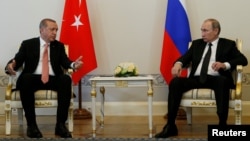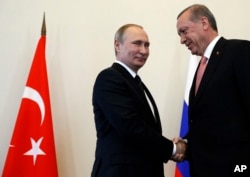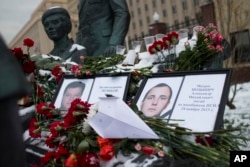Russian President Vladimir Putin has agreed to work toward restoring full relations with Turkey, but said rebuilding trade ties will be time consuming.
"Ahead of us lies painstaking work to resuscitate trade and economic cooperation. This process has already started, but it will take some time," Putin said Tuesday after meeting with Turkish President Tayyip Erdogan in Saint Petersburg.
Erdogan said the two countries will restore their yearly bilateral trade target of $100 billion and will speed up the resumption of charter flights from Russia to Turkey.
The Turkish leader also said he is ready to build a natural gas pipeline with Russia and negotiate a deal to construct Turkey's first nuclear power plant.
The two agreed to meet later to seek common ground over how to resolve the crisis in Syria. Turkey and Russia support opposing sides in the conflict.
Marc Pierini, visiting scholar at Carnegie Europe and former EU ambassador to Turkey, told VOA there are no guarantees that Russia and Turkey can overcome their differences over the Syrian conflict.
"Whether one day they can come to some sort of understanding on this, I doubt,” Pierini said. “It may take a little more than just a meeting. Maybe counterterrorism cooperation will resume, and it will be a first step. But I doubt you can see a long-term relationship if Turkey doesn't change its position on [Syrian President Bashar] al-Assad."
Erdogan is turning to Russia after post-coup criticism from the West and in an effort to mend relations with Russia after Turkey shot down a Russian fighter plane along the Syrian border last year.
"Your visit today, despite a very difficult situation regarding domestic politics, indicates that we all want to restart dialogue and restore relations between Russia and Turkey," Putin told Erdogan.
Alexander Baunov of the Carnegie Moscow Center said, “It is significant for both because both of them have to bargain hard with the West. Putin is about sanctions and about normalizing the relations, about bringing them more [to] business as usual."
"Erdogan wants, of course, that after crushing the coup he is criticized too much by the Western politicians, journalists, and media," Baunov added. "For him to bargain means to show that he can get closer to Russia and alienate himself from the West.”
Erodgan was livid after Western nations that condemned the coup attempt last month also criticized him for his massive crackdown in response to the putsch. Pierini said the response was in accordance with international law.
"It means that we don't want to see coups and we support the legitimate government and president. But it means also the rule of law while fixing the coup,” he said.
Russia was quick to condemn the Turkish insurgents. More than 270 people died during the failed attempt by some elements of the military.
Erdogan has accused Turkish cleric Fethullah Gulen, who is exiled in the U.S., of orchestrating the coup. On Tuesday, Erdogan warned the U.S. that if it fails to extradite Gulen, it would cause great harm to relations between the countries.
U.S. State Department spokeswoman Elizabeth Trudeau told reporters Tuesday in Washington, "This [extradition] is not a process that is influenced by emotion or political rhetoric. It's actually governed by a treaty."
Erdogan viewed the Western response to the crackdown as betrayal, says Moscow State Institute of International Affairs' Victor Mizin.
“So, what he decided, it's some kind of his version of 'pivot to the East,' promoting the relations with such countries like Azerbaijan, Iran, Kazakhstan,” Mizin said.
But the relationship with Russia is the most important tactically, and not just for Turkey.
“Now it's very important [for Russia] to turn this country, which was the spearhead of NATO against the Soviet Union in the past, and where so many intelligence assets or radars had been placed to monitor Russian military activity, to draw it back to Russia and to resume good relations,” Mizin said.
Jet downing
The face-to-face talks in St. Petersburg are expected to focus on restoring economic ties that were severed after Turkey’s F-16 shot down Russia’s SU-24, resulting in the deaths of one jet pilot and a rescue pilot killed during a recovery attempt.
The incident sparked finger-pointing, Russian sanctions, and fears of a wider conflict between Russia and the NATO member. Moscow accused Ankara of supporting terrorism, while Turkey accused Russia of violating its airspace and bombing civilian targets inside Syria.
Russia imposed costly economic sanctions on Turkey, including banning Turkish food imports as well as Russian vacationers from visiting Turkey, striking a multi-billion dollar blow to the country and its important tourist trade.
But, a surprisingly fast rapprochement came in late June after Erdogan gave a long-demanded apology, expressing regret to the families of the two pilots in a letter to Putin. More recently, he accused the pilots of the Turkish F-16 of being involved in the coup. They were earlier arrested.
Political analysts say that while Erdogan’s quick 180-degree turn was motivated by the economic damage caused by lost Russian trade, tensions with his Western allies in Europe and the United States have spurred the face-to-face meeting with Putin.
Not all common ground
Some minority calls inside Turkey for Ankara to seek a strategic partnership with Russia to replace ties with the United States and the European Union are unlikely to gain ground.
“At the same time, I think it would be unrealistic to think that Turkey could be banished or ousted from NATO as certain American experts, especially on the conservative side would suggest because, as I said, strategically, Turkey is too important,” Mizin said.
While progress in the talks is expected on economic issues, the conflict in Syria remains a sticking point.
Russia’s bombing campaign in support of Syria’s President Bashar al-Assad had already put a chill on relations between Moscow and Ankara, which supports rebel groups in Syria’s five-year civil war and wants to see Assad leave power.
VOA's Natasha Mozgovaya and VOA's Nike Ching contributed to this report.








